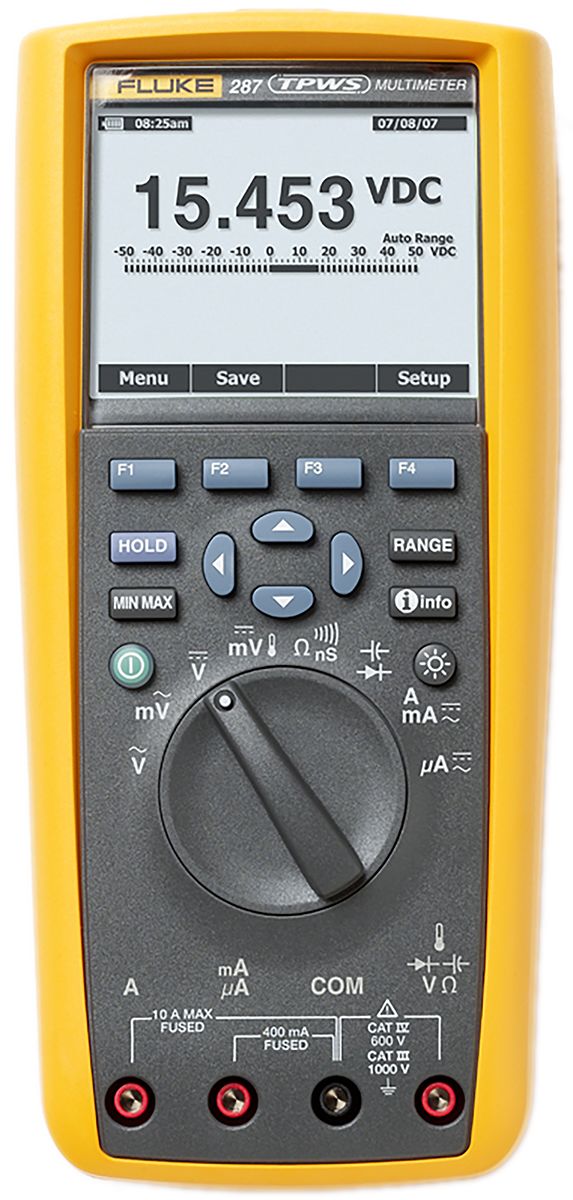Unraveling Fluke 287: From Full Specifications To Potential Issues
Fluke 287 Information
The Fluke 287 True-RMS Electronics Logging Multimeter with TrendCapture is a high-end handheld multimeter that is designed for professional use. It features a wide range of measurement capabilities, including true-RMS AC voltage and current, resistance, capacitance, frequency, duty cycle, temperature, and diode testing. The multimeter also has a built-in data logger that can record up to 10,000 readings, and it can be connected to a PC for further analysis.
Introduction
The Fluke 287 is a powerful tool that can be used for a wide variety of electrical measurements. It is ideal for use in electronics troubleshooting, maintenance, and repair. The multimeter is also well-suited for use in industrial settings, where it can be used to monitor and troubleshoot electrical systems.
Features
The Fluke 287 features a large, backlit display that makes it easy to read readings in any lighting conditions. The multimeter also has a number of user-friendly features, such as:
- TrendCapture: This feature allows you to record and view graphical data of your measurements. This can be helpful for troubleshooting problems and identifying trends.
- Zoom on trend: This feature allows you to zoom in on specific areas of your TrendCapture data for closer inspection.
- Selectable AC filter: This feature helps to reduce noise in your measurements, making them more accurate.
- Relative mode: This mode allows you to subtract the resistance of your test leads from your measurements, giving you more accurate results.
- Peak capture: This feature allows you to record brief, high-voltage transients. This can be helpful for troubleshooting problems that are caused by transient voltage spikes.
Specifications
The Fluke 287 has the following specifications:
| Feature | Specification |
|---|---|
| Display | 50,000 count, ¼ VGA display with white backlight |
| Measurement ranges | True-RMS AC voltage: 200 mV to 1000 V, AC current: 20 mA to 10 A (20 A for 30 seconds), DC voltage: 200 mV to 1000 V, DC current: 20 mA to 10 A, resistance: 20 Ω to 40 MΩ, capacitance: 10 nF to 100 mF, frequency: 10 Hz to 100 kHz, duty cycle: 0.1% to 99.9% |
| Accuracy | True-RMS AC voltage: ±0.02%, AC current: ±0.05%, DC voltage: ±0.02%, DC current: ±0.05%, resistance: ±0.1%, capacitance: ±2%, frequency: ±0.01%, duty cycle: ±0.01% |
| Data logger | Records up to 10,000 readings |
| Data transfer | USB |
| Dimensions | 22.2 x 10.2 x 6 cm (8.75 x 4.03 x 2.38 in) |
| Weight | 360 g (12.7 oz) |
What's in the box
The Fluke 287 comes in a carrying case and includes the following items:
- Fluke 287 multimeter
- Test leads
- Alligator clips
- Amp jack plugs
- Instruction manual
Pricing
The Fluke 287 is a high-end multimeter, and its price reflects that. The multimeter is currently priced at around $700.
Conclusion
The Fluke 287 is a powerful and versatile multimeter that is ideal for professional use. It is a good choice for electronics troubleshooting, maintenance, and repair. The multimeter is also well-suited for use in industrial settings.
Here are some of the pros and cons of the Fluke 287:
Pros:
- Wide range of measurement capabilities
- Built-in data logger
- Easy to use
- Accurate
- Durable
Cons:
- Expensive
- Not as portable as some other multimeters
Overall, the Fluke 287 is a high-quality multimeter that is well-suited for professional use. It is a good choice for anyone who needs a reliable and accurate multimeter for electronics troubleshooting, maintenance, and repair.
Fluke 287 Compare with Similar Item
a table comparing the Fluke 287 to two similar multimeters:
| Feature | Fluke 287 | Fluke 117 | Fluke 87V |
|---|---|---|---|
| True RMS | Yes | Yes | Yes |
| Auto-ranging | Yes | Yes | Yes |
| Memory | 64,000 displayable values | 2,000 displayable values | 1,000 displayable values |
| Data logging | Yes | No | No |
| Max. current | 10A | 10A | 10A |
| Max. voltage | 1,000V | 750V | 750V |
| Weight | 0.28 lbs | 0.51 lbs | 0.48 lbs |
| Price | $399 | $129 | $229 |
As you can see, the Fluke 287 is the most advanced of the three multimeters, with a larger memory, data logging capabilities, and a higher maximum current and voltage. However, it is also the most expensive. The Fluke 117 is a good value for the price, as it offers true RMS measurements and auto-ranging at a fraction of the cost of the Fluke 287. The Fluke 87V is a good option for basic electrical measurements, but it does not offer true RMS measurements or data logging.
Here is a summary of the key differences between the three multimeters:
- Fluke 287: Most advanced multimeter, with true RMS measurements, auto-ranging, data logging, and a large memory.
- Fluke 117: Good value for the price, with true RMS measurements and auto-ranging.
- Fluke 87V: Basic multimeter, with no true RMS measurements or data logging.
Ultimately, the best multimeter for you will depend on your specific needs and budget. If you need a high-end multimeter with all the bells and whistles, then the Fluke 287 is a great option. If you are on a budget, then the Fluke 117 is a good value. And if you only need basic electrical measurements, then the Fluke 87V is a good choice.
Fluke 287 Pros/Cons and My Thought
The Fluke 287 is a high-end digital multimeter that offers a wide range of features, including true RMS measurement, datalogging, and on-screen graphing. It is a popular choice for professional electricians and technicians, as well as hobbyists and DIYers.
Pros:
- True RMS measurement: This ensures accurate readings for both AC and DC signals, regardless of their waveform.
- Datalogging: The Fluke 287 can store up to 10,000 readings, which can be used to track changes in a circuit over time.
- On-screen graphing: The Fluke 287 can display readings in a variety of graphical formats, making it easy to identify trends and anomalies.
- Backlit display: The Fluke 287's display is backlit, making it easy to read in low-light conditions.
- Durable construction: The Fluke 287 is built to withstand harsh environments, making it a reliable tool for professional use.
Cons:
- Expensive: The Fluke 287 is a high-end multimeter, so it is more expensive than some other models.
- Complex: The Fluke 287 has a lot of features, which can make it difficult to use for some users.
- Requires adapter for data transfer: The Fluke 287 does not come with an adapter for data transfer, so you will need to purchase one separately.
User reviews:
Positive:
- "This is the best multimeter I've ever owned. It's accurate, durable, and easy to use."
- "The datalogging feature is really helpful for tracking changes in a circuit over time."
- "The on-screen graphing is a great way to visualize data."
Negative:
- "It's a bit expensive, but it's worth it for the quality and features."
- "The user interface can be a bit confusing at first."
- "You need to purchase an adapter separately for data transfer."
My thoughts:
The Fluke 287 is a great multimeter for professionals and hobbyists who need a reliable and accurate tool. It has a wide range of features, including true RMS measurement, datalogging, and on-screen graphing. However, it is a bit expensive and the user interface can be confusing at first. Overall, I think the Fluke 287 is a great multimeter, but it may not be the best choice for everyone.
If you are looking for a high-end multimeter with a wide range of features, the Fluke 287 is a great option. However, if you are on a budget or are looking for a more user-friendly multimeter, there are other models that may be a better fit.
Fluke 287 Where To Buy
some places where you can buy a Fluke 287 multimeter and spare parts:
- Fluke Direct: This is the official website of Fluke, so you can be sure that you are getting an authentic product. They also offer a variety of spare parts for the Fluke 287.

- Walmart: Walmart is a great place to find electronics at a good price. They often have sales on Fluke multimeters, so you can save some money.
- Amazon: Amazon is another great option for buying electronics. They have a wide selection of Fluke multimeters and spare parts, and you can often find them at a discounted price.

- Best Buy: Best Buy is a good option if you want to be able to see and test the Fluke 287 before you buy it. They also have a good selection of spare parts.

- Lowes: Lowes is a good option if you are looking for a local store to buy a Fluke 287. They often have sales on electronics, so you can save some money.

- eBay: eBay is a good option if you are looking for a used or refurbished Fluke 287. You can often find them at a discounted price.

I hope this helps!
Fluke 287 Problems and Solutions
some common issues and solutions for the Fluke 287 multimeter:
Issue: The multimeter is not turning on. Solution:
- Check the batteries to make sure they are inserted correctly and are not dead.
- Try using different batteries or a different power source for the multimeter.
- If the multimeter still does not turn on, contact Fluke customer support for assistance.
Issue: The multimeter is not displaying accurate readings. Solution:
- Check the connections to make sure they are secure.
- Make sure the multimeter is set to the correct range.
- If the multimeter is still not displaying accurate readings, contact Fluke customer support for assistance.
Issue: The multimeter is not storing calibration settings. Solution:
- Make sure the batteries are inserted correctly and are not dead.
- Try resetting the multimeter. To do this, turn the rotary switch to Off and then back to the On position.
- If the multimeter is still not storing calibration settings, contact Fluke customer support for assistance.
Issue: The multimeter is displaying an error message. Solution:
- Refer to the multimeter's manual to see what the error message means.
- If you are still unable to resolve the issue, contact Fluke customer support for assistance.
Here are some additional tips for troubleshooting Fluke 287 multimeter problems:
- Always start by checking the batteries. Dead batteries are a common cause of multimeter problems.
- Make sure the multimeter is set to the correct range. Using the wrong range can cause inaccurate readings.
- If you are still having problems, contact Fluke customer support for assistance. They will be able to help you troubleshoot the issue and get your multimeter up and running again.
I hope this helps!



Comments
Post a Comment